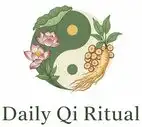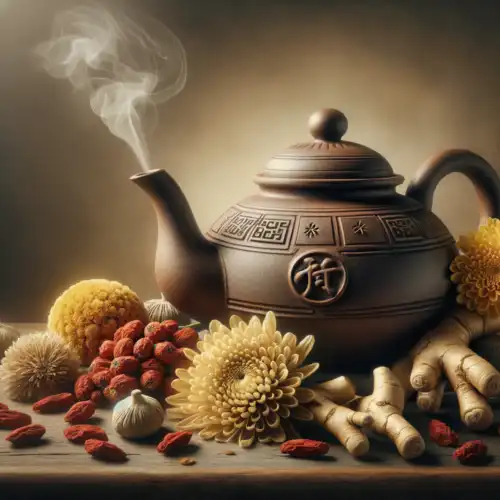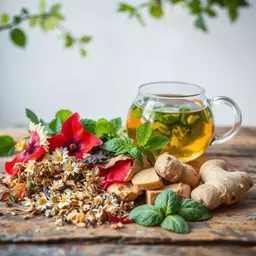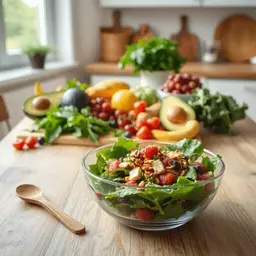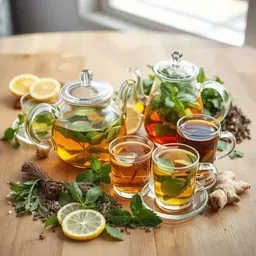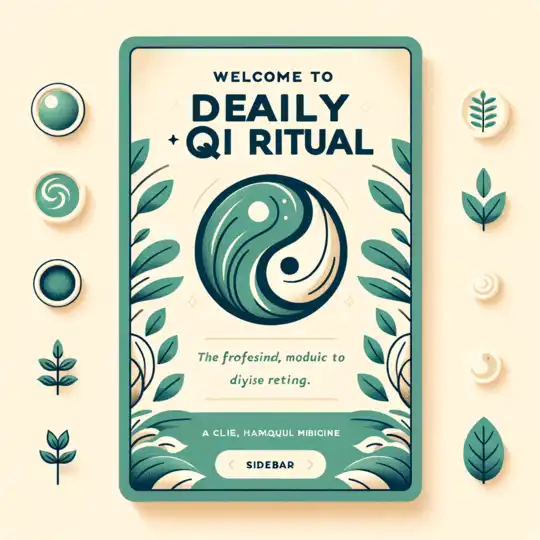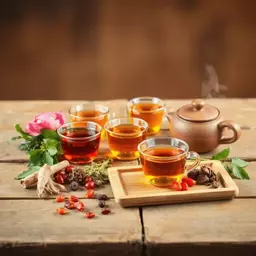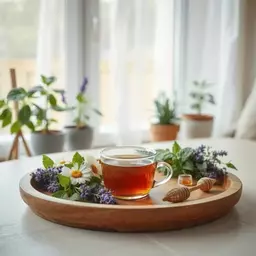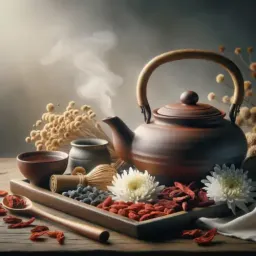Did you know that herbal teas have been an integral part of Traditional Chinese Medicine (TCM) for centuries, serving not just as beverages but as powerful remedies? Discover how these natural infusions can enhance your well-being and transform your health routine.
What You Will Learn
- Herbal teas are essential in TCM for promoting balance and harmony within the body.
- Different herbal blends can target specific health concerns, such as digestion, relaxation, and immunity.
- Proper preservation techniques enhance the longevity and effectiveness of herbal teas.
- Personalizing your tea choices according to individual health needs can optimize their benefits.
- Exploring various infusion and decoction methods allows for a richer experience of herbal benefits.
Benefits of Herbal Teas in Traditional Chinese Medicine
Herbal teas offer a range of health benefits recognized in Traditional Chinese Medicine (TCM). Below is a visual representation of the various benefits and combinations of herbal teas.
Health Benefits
- Supports Digestive Health
- Boosts Immunity
- Reduces Stress and Anxiety
- Enhances Skin Health
- Provides Pain Relief
Popular Tea Combinations
- Ginger + Lemon Balm
- Mint + Lavender
- Oolong + Chrysanthemum
Preservation Techniques
- Store in a cool, dry place
- Use airtight containers
- Label with purchase dates
Personalization Tips
- Identify health goals
- Experiment with different herbs
- Consult with a TCM practitioner
Understanding the Role of Herbal Teas in Traditional Chinese Medicine
Have you ever wondered why herbal teas are so deeply woven into the fabric of Traditional Chinese Medicine (TCM)? They’re not just delicious beverages; they represent a rich tradition of holistic health and well-being. At Daily Qi Ritual, I believe that understanding this connection can help us appreciate the profound benefits these teas offer for our bodies and minds.
Traditional Chinese Medicine views health as a balance of energy, or Qi, within the body. Herbal teas play a crucial role in this balance, delivering natural remedies that align with the principles of TCM. They are crafted from various herbs that can support different bodily functions, making them essential in maintaining our overall health.
Introduction to Traditional Chinese Medicine and Herbal Teas
In TCM, every herb has unique properties and functions. Herbal teas are a convenient way to access these benefits while enjoying a soothing drink! For example, many herbal teas are designed to nourish the body, harmonize energy, and provide relief from various ailments.
When we sip on herbal teas, we’re not merely quenching our thirst; we’re also participating in a ritual that promotes wellness. This ancient practice embraces the wisdom of nature, reminding us to slow down and connect with ourselves. Studies, such as those published in the Journal of Traditional Chinese Medical Sciences, and insights from Harvard Health highlight the various health benefits associated with herbal teas in TCM .
- Supports digestive health
- Boosts immunity
- Reduces stress and anxiety
- Enhances skin health
- Provides pain relief
The Importance of Herbal Teas in TCM
Herbal teas serve as powerful allies in our daily wellness routines. They integrate seamlessly into our lives, providing a simple yet effective way to enhance our health. Embracing these teas can transform everyday moments into meaningful rituals that nurture our well-being.
For me, it’s all about finding the right blend that resonates with my needs. This personal connection to herbal teas is a cornerstone of TCM, emphasizing that we should honor our unique health journeys and choices. Let’s explore some ways herbal teas can support our health below!
- Facilitating relaxation and sleep
- Encouraging digestion and nutrient absorption
- Promoting hydration and detoxification
- Enhancing mental clarity and focus
Frequently Asked Questions About Herbal Teas in TCM
- What role do herbal teas play in Traditional Chinese Medicine (TCM)?
- Herbal teas are essential for promoting balance and harmony within the body, delivering natural remedies aligned with TCM principles.
- What are the main health benefits of herbal teas in TCM?
- They support digestive health, boost immunity, reduce stress and anxiety, enhance skin health, and provide pain relief.
- How should I store herbal teas to maintain their effectiveness?
- Store them in a cool, dry place away from sunlight, and use airtight containers to prevent moisture and air exposure.
- Can I combine different herbal teas for enhanced health benefits?
- Yes, combining specific herbs can create a tea that targets multiple health concerns simultaneously. For example, ginger and chamomile can soothe digestion and promote relaxation.
- How can I personalize my herbal tea choices?
- Consider your unique health needs and preferences, experiment with different herbs, and consult with a TCM practitioner for tailored recommendations.
Pro Tip
Did you know? To maximize the benefits of your herbal teas, consider pairing them with mindful practices such as meditation or yoga. This enhances not only the physical benefits of the tea but also supports mental clarity and emotional balance, aligning perfectly with TCM principles.
Addressing Content Gaps in TCM and Herbal Teas
While the world of Traditional Chinese Medicine (TCM) is rich with knowledge about herbal teas, there are still areas that deserve more attention. For instance, understanding the right techniques for preserving these precious herbs can enhance their benefits and longevity. Research on preserving herbal properties, such as that found in the *Journal of Agricultural and Food Chemistry* [1], underscores the importance of proper storage. From storage methods to the right conditions, being informed can help you enjoy the full potential of herbal teas!
Preservation techniques are crucial because they ensure that the healing properties of the herbs remain intact. Here are some effective ways to store your herbal teas:
- Store in a cool, dry place away from sunlight.
- Use airtight containers to prevent moisture and air exposure.
- Label your teas with purchase dates to keep track of freshness.
Preservation Techniques for Herbal Teas in TCM
Another important aspect is combining different herbal teas for enhanced health benefits. By blending specific herbs, you can create a tea that targets multiple health concerns at once. For example, a blend of ginger and chamomile can soothe digestion and promote relaxation simultaneously. Isn't it exciting to think about how simple combinations can elevate your well-being?
Here are some popular combinations to try:
- Ginger + Lemon Balm for digestive support and relaxation.
- Mint + Lavender for stress relief and a refreshing taste.
- Oolong + Chrysanthemum for metabolism and skin health.
Combining Various Herbal Teas for Enhanced Health Benefits
Personalizing your herbal tea choices is another key aspect of TCM. Everyone’s body is different, and what works for one person might not work for another. When selecting your teas, consider your unique health needs and preferences. This approach not only makes your tea-drinking experience more enjoyable but also more effective! Studies on personalized medicine within TCM, like those in Evidence-Based Complementary and Alternative Medicine and this systematic review of the evidence-backed efficacy of herbal teas in Traditional Chinese Medicine, support this approach.
Here are some tips for personalizing your herbal tea choices:
- Identify your health goals: Are you looking for energy, relaxation, or digestive aid?
- Experiment with different herbs to find what resonates with you.
- Consult with a TCM practitioner for tailored recommendations.
Personalizing Herbal Tea Choices Based on Individual Health Needs
Furthermore, exploring herbal infusions and decoctions can reveal the depth of TCM practices. Infusions are typically lighter, made by steeping leaves in hot water, while decoctions involve boiling roots and tougher herbs for a more concentrated flavor. These methods allow you to experience the full spectrum of benefits offered by each herb.
Here’s a simple guide to get you started:
- For infusions: Use one teaspoon of dried leaves per cup of water, steep for 5-10 minutes.
- For decoctions: Use one tablespoon of roots per cup of water, boil for 20-30 minutes.
Summarizing the Multifaceted Benefits of Herbal Teas in TCM
As we reflect on the many ways herbal teas can contribute to our health, it’s clear they offer a wealth of benefits—from improving digestion to boosting immunity. At Daily Qi Ritual, I encourage you to embrace these ancient practices as part of your daily life. Imagine sipping a warm cup of tea that not only warms your body but also nurtures your spirit!
So, what’s stopping you? Let’s incorporate herbal teas into our wellness journey and experience the balance and harmony they bring to our lives. Remember, every small step counts! By making a simple cup of herbal tea part of your routine, you take a step towards holistic well-being.
Recap of Key Points
Here is a quick recap of the important points discussed in the article:
- Herbal teas play a crucial role in Traditional Chinese Medicine (TCM), promoting balance and wellness through natural remedies.
- Different herbal teas support various health functions, including digestion, immunity, stress reduction, and skin health.
- Proper preservation techniques are essential for maintaining the healing properties of herbal teas, such as storing them in cool, dry places and using airtight containers.
- Combining different herbal teas can enhance health benefits, allowing you to target multiple concerns with one blend.
- Personalizing your herbal tea choices based on individual health needs is key to maximizing their effectiveness and enjoyment.
- Understanding the preparation methods, like infusions and decoctions, can deepen your experience and appreciation of herbal teas.
